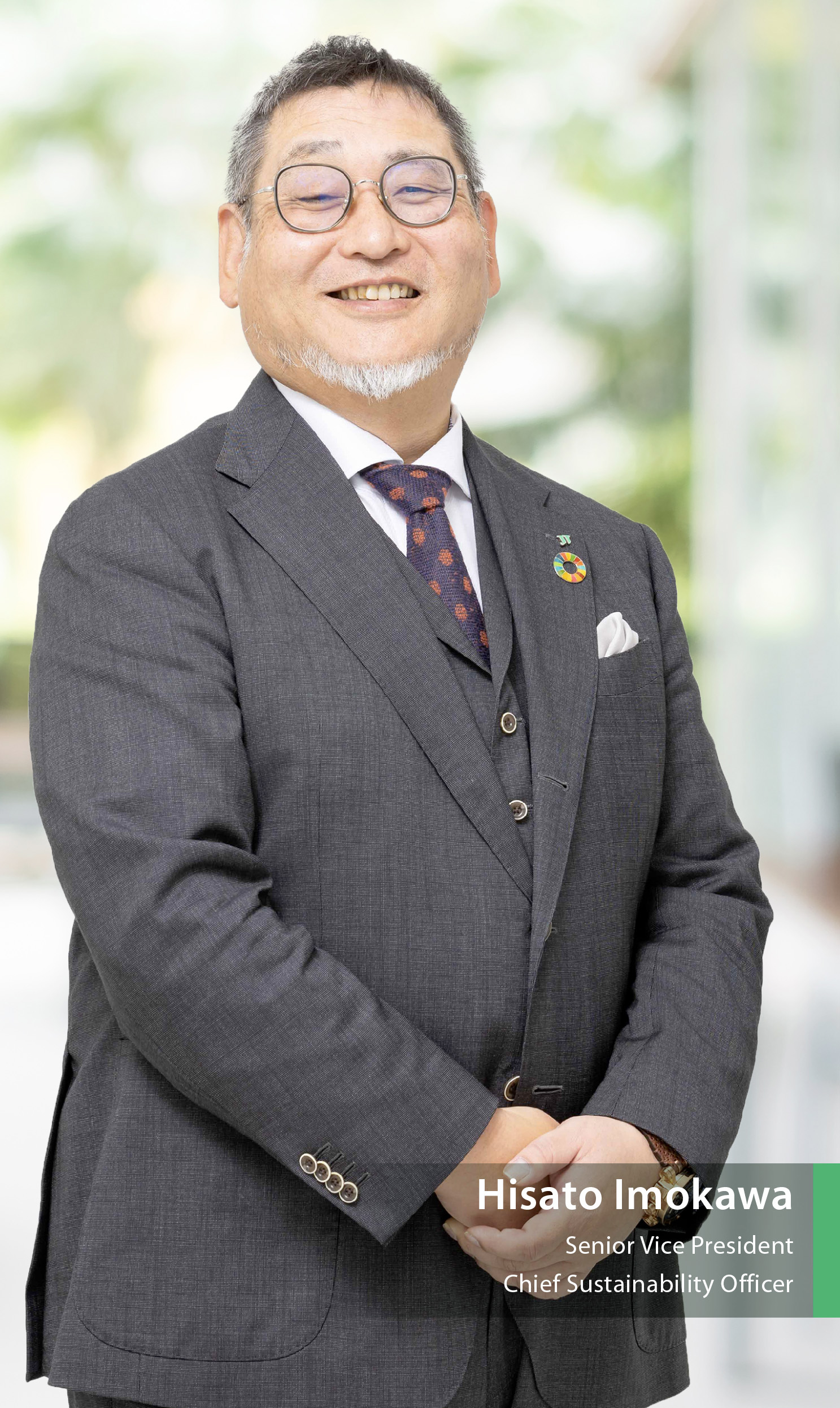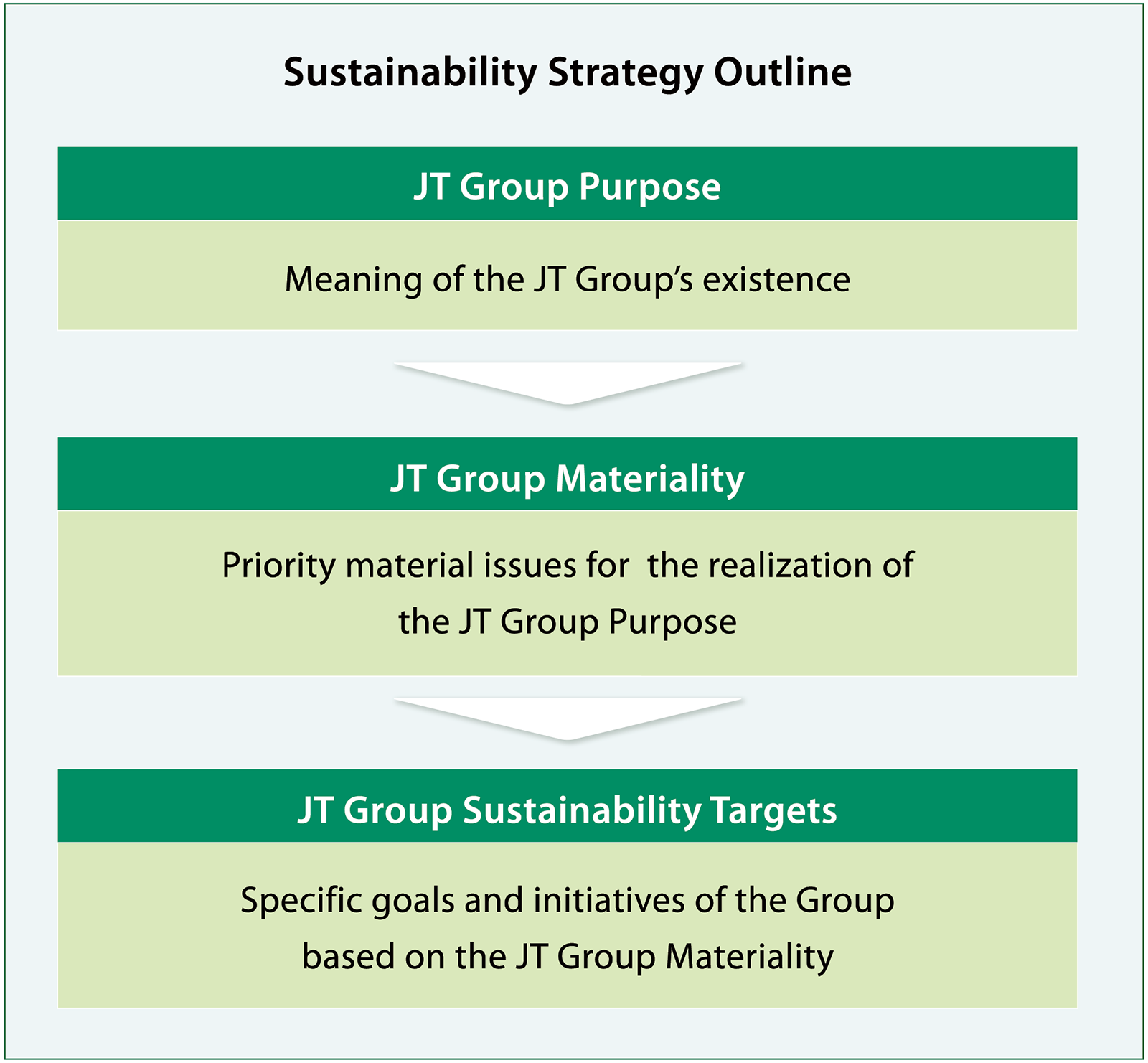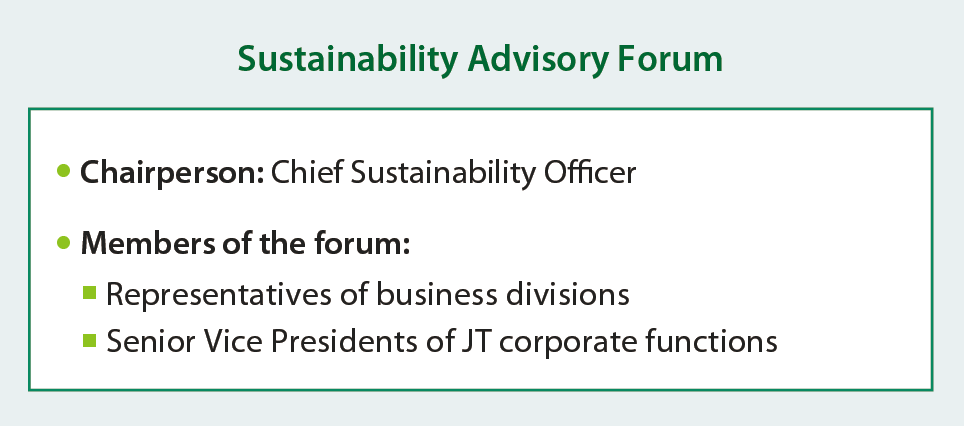Only when nature and society are sustainable can business and people's lives be sustainable
Hisato Imokawa
Senior Vice President
Chief Sustainability Officer

Hisato Imokawa
Senior Vice President
Chief Sustainability Officer
The JT Group’s management principle is the 4S model. Under the 4S model, we strive to fulfill our responsibilities to our valued consumers, shareholders, employees and the wider society, carefully considering the respective interests of these four key stakeholder groups and exceeding their expectations wherever we can. Our group has always conducted business by engaging with various stakeholders, a familiar concept in sustainability. As nature, society and people’s lives are inter-twined, sustaining our ways of living, and the activities of busi-nesses, will depend on the sustainability of the environment and society in which we exist. This is the basis of our approach to sustainability.
For example, leaf tobacco is one of the key raw materials for our tobacco business, our core business of the Group. Sustainability of the natural surroundings and the leaf farming communities from which leaf tobacco is cultivated is crucial for the stable procurement of leaf tobacco over the mid- to long-term. “Human capital,” for example, is the driving force of our business activities. The sustainability of our business is only attainable if the environment and conditions in which our employees find themselves are secure, stable and sustainable. The same is true for the local communities of our stakeholder groups. As the Group CSO responsible for sustainability, I carry out my duties with the awareness that nature and society or human life and corporate activities are all connected and interrelated.
The JT Group has created the JT Group Purpose, “Fulfilling Moments, Enriching Life.” This indicates the direction in which the Group should be heading to ensure the sustainability of our society and Group’s businesses therein. In pursuing our management principle, the 4S model, and by realizing the JT Group Purpose, we have identified the Group’s material topics which should be prioritized. Specifically, we have identified five groups of material topics, which we refer to as the JT Group Materiality. These are “Living with the planet” “Value creation that exceeds consumer expectations” “Investing in our people and supporting their growth” “Responsible supply chain management” and “Good governance.”

Furthermore, in 2024, we have set specific targets and initiatives based on the JT Group Materiality. The JT Group Sustainability Targets consists of a total of 25 items. The JT Group Purpose, the JT Group Materiality and the related JT Group Sustainability Targets are the backbone of our sustainability strategy. Our Board is involved in setting and managing the sustainability strategy. The progress and results of our initiatives are communicated to our stakeholders through the company website or the Integrated Report. The JT Group Sustainability Targets are reviewed every year so that they can evolve. In 2025, targets were reviewed and updated.
In 2024, the JT Group Sustainability Targets consisting of 25 items were set. We have targets for our tobacco business, our core business, which are related to one of the JT Group Materiality “Value creation that exceeds consumer expectations.” One of the targets aims to expand the number of markets where RRP are available—this is a target we carried over from the previous tobacco sustainability target. We have also set a new target, “Transparency in reduced-risk science” whereby we will ensure that reduced-risk claims are substantiated and that we are transparent about the risks of our products. These targets will accelerate the Group’s focus on RRP.
In relation to “Living with the planet,” another JT Group Materiality we have established targets related to biodiversity, a subject which has become increasingly important in recent years. We have set forth the implementation of biodiversity impact assessments, and we are currently working on the assessments throughout the value chain of our tobacco business. Since the Group's impact on ecosystems varies from region to region, even within the same tobacco business, it will become increasingly important to find more region-specific solutions. Rather than a top-down approach from the head office, my aim is that each region and operation will develop their own solutions. As CSO, I will facilitate and support these initiatives.
This is the first year that we are reporting on the progress of the JT Group Sustainability Targets. Since most of the targets are mid- to long-term, we can’t explain all of our progress based on the results of a single year. Nevertheless, I trust we can say we are generally off to a good start. I also recognize that we are gradually and surely putting in place our own system for promoting and driving these targets.
For example, in terms of our targets to tackle climate change which is related to our materiality “Living with the planet” there was qualitative and quantitative progress made in the management of these targets. Looking at the GHG emissions reduction targets in 2024, Scope 1 & 2 GHG emissions reduction progressed steadily in line with the targets. As for Scope 3 GHG emissions reduction involving engagement with our value chain this has always been a challenge. We therefore encouraged our key suppliers to work on science-based GHG emissions reduction targets and progress was made towards better data collection. Our Group is working to make its operations carbon neutral by 2030 and achieve Net-Zero GHG emissions across the entire value chain by 2050. We have taken several steps to achieve these goals. In 2022, SBTi validated targets set by our Group in pursuit of limiting the increase in global aver-age temperature to less than 1.5°C above pre-industrial levels. In September 2024, we submitted an application to obtain SBTi validation for Net-Zero GHG emissions across our value chain.
Another important subject related to the Group’s supply chain management is respect for human rights. We have always made efforts to implement human rights due diligence not only within our Group but also throughout our supply chain. COVID-19 prevented us from physical travel, but even during this period, we continued with our due-diligence initiatives by using on-line alternatives. Across the JT Group, at the end of 2024, Human Rights Impact Assessments have been completed in 16 countries, and evaluations using self-assessment questionnaires in 18 countries.
Read more about the JT Group Sustainability Targets and FY2024 results
We have set out a governance structure in which the Board of Directors are involved in setting and managing the sustainability strategy as well as updating the sustainability targets. At the executive management level, we have held regular Sustainability Advisory Forums since 2020 to discuss the Group’s sustainability issues. As CSO, I chair the forum - it is attended by the heads of the JT Group’s businesses and corporate functions.

In 2024, three forums were held. We discussed and shared information about topics such as updating the JT Group Sustainability Targets, our initiatives and targets related to tackling climate change, progress on human rights due diligence, preparing for the start of the EU Corporate Sustainability Reporting Directive, non-financial data management and stakeholder engagement, among others.
Discussions at the forum are duly reported to the CEO and the Board of Directors.
In 2024, geo-political instability and conflicts continued in various parts of the world. It was also a year of elections as we witnessed changes in governments in the United States, the United Kingdom, as well as a cabinet reshuffle in Japan where the JT Group has its head office. This instability will likely continue in 2025, and we may feel the impact of policy shifts from changes in governments in key countries. Nevertheless, our approach and stance on sustainability remains unchanged: As nature, society and people’s lives are intertwined, sustaining our ways of living, and the activities of businesses, will depend on the sustainability of the environment and society in which we exist.
Looking ahead, we are proactively addressing the challenges for the mid- to long-term. Through our sustainability initiatives, we handle various data and information which are often referred to as ‘non-financial information’. Some non-financial information is needed for disclosure purposes. But I believe there are other non-financial information and data that could be utilized to add and create new value, if we could make good use of them. We are working on establishing a non-financial data management system that could lead to the realization of our purpose ‘Fulfilling Moments, Enriching Life’.
Sustainability disclosure regulations will be in force in many countries in the future. Large-scale global companies with offices in Europe are preparing for their first CSRD reporting. Our Group, with our tobacco business headquarters in Europe, is also preparing to comply with CSRD reporting requirements. The implementation of CSRD has been postponed and there are still some uncertainties. Nevertheless, in Japan, the Sustain-ability Standards Board of Japan (SSBJ) has issued a sustainability disclosure standard that is going to be adopted in the near future. As we are required to communicate both qualitative and quantitative sustainability information, it is vital that we can collect, manage and disclose accurate, high-quality data.
I am personally interested in how we use various capitals and what we give back in relation to the society and the natural environment our business operates in. I’m interested in how these activities are inter-connected, whether we can identify these connections in a broader sense. Companies, including the JT Group, use resources from the surrounding environment as well as resources from our society thereby drawing upon human, social and natural capital. We make use of these capitals and in doing so add some kind of value. Eventually these are provided back to the environment or to society. I believe that sustainability is about maintaining or circulating this cycle as a positive system. My aim is to build a clear picture of this cycle and, if possible, quantify the flow of capital. This would enable us to look at various initiatives and challenges from a different perspective especially where an activity may have been considered simply as a cost burden but in fact leads to value creation. This exercise therefore has the potential to transform our decision making. It would be difficult for us to drive this on our own, so we would like to collaborate and work with partner companies that have expertise and knowledge in this area.
While responding swiftly and flexibly to changes in the business environment, we will continue to duly face the challenges ahead to realize our purpose "Fulfilling Moments, Enriching Life”. We will do so through co-creation with our partner companies and stakeholders.